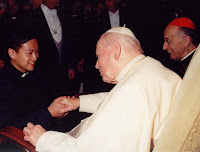 Since the time of Don Bosco, there has been a tradition in our Salesian houses to stage an accademia (usually a cultural presentation meant to instruct the boys on the upcoming feast). It was held on the eve of the feast. And it was so in my experience of Salesian life, even when I was a young aspirant in high school. When I was a brother in practical training, I staged accademias at the eve of almost every solemnity.
Since the time of Don Bosco, there has been a tradition in our Salesian houses to stage an accademia (usually a cultural presentation meant to instruct the boys on the upcoming feast). It was held on the eve of the feast. And it was so in my experience of Salesian life, even when I was a young aspirant in high school. When I was a brother in practical training, I staged accademias at the eve of almost every solemnity.
Tonight, on the eve of the Solemnity Our Lady’s Immaculate Conception, I am quite emotional. I have just come from a play staged by our Seminarians, a play entitled Ineffabilis Deus. As I watched, memories of my years as a brother came back.
And why would it not be so when this was one which I wrote and directed for the Solemnity of the Immaculate Conception on December of 1995? It was a play done by the batch of many of those who were ordained in 2005; they did it when they were postulants.
As I said, the play was entitled Ineffabilis Deus (the title of the papal document on the dogma of the Immaculate Conception). The whole musical was actually a discussion of the doctrine. It focused on the ideas that surrounded the debate between theologians throughout the ages on the Immaculate Conception. It culminated in presenting the view of the ideas of the Franciscan philosopher and theologian John Duns Scotus. The play echoed the words: Potuit, decuit; ergo fecit! (“He could; it was fitting; therefore, He did it!”) Yes, God could make Mary immaculately conceived; it was fitting that the one who would be Mother of God be immaculately conceived; and therefore He did it!
We can have a lot of reflections on this celebration but I would just like to focus on the point that the privilege granted by God to Mary was a gratuitous gift. But Mary did not just sit on this privilege. Before God’s eyes she sought to be worthy of this gift. We may not be blessed to have that privilege of being immaculately conceived, but we are graced with so many blessings from God. We have a lot to thank him for. May this thought lead us to be more conscientious in what God has called us to be. He has given us so much and so we must not be complacent; otherwise, we will be wasting a lot of the good that the Lord has bestowed on each of us. The beauty in the privilege given to Mary was that it had fruits as lived in a life that experienced Jesus and then “treasured all these things and pondered them in her heart.” (Lk 2:19)

